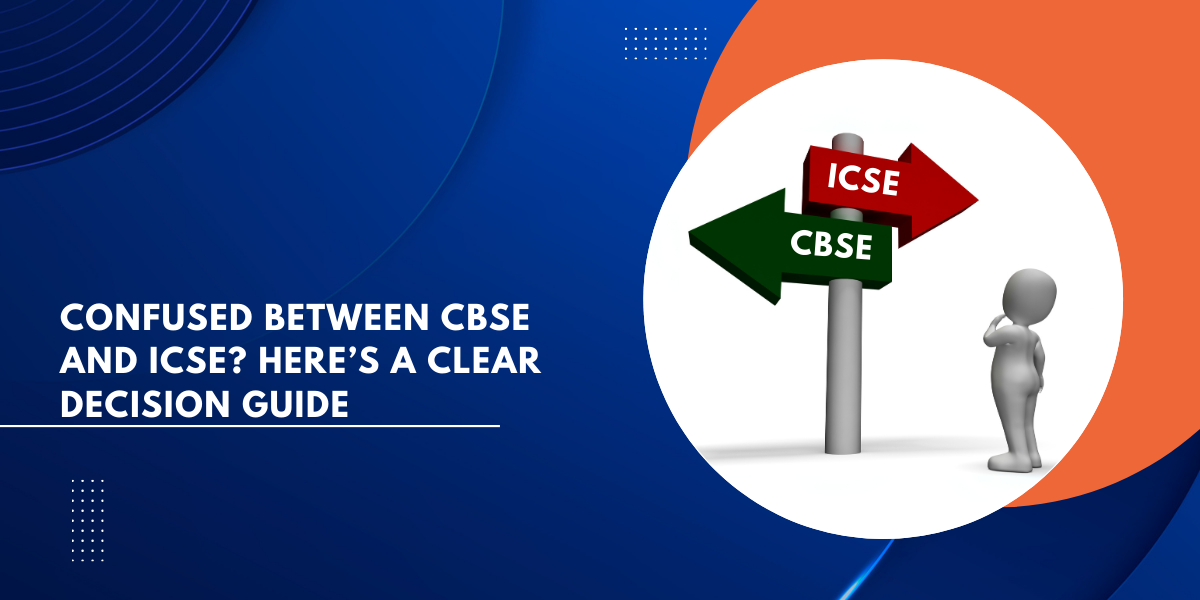Introduction: Addressing a Common Career Challenge
“Which board is better — CBSE or ICSE?”
It’s a question I hear from parents almost every week. Whether I’m at a career guidance session or a school seminar, this topic sparks passionate debates and deeply felt anxieties.
As a parent, I get it. Choosing the right educational board can feel like a monumental decision. It’s not just about academics — it’s about your child’s self-confidence, stress levels, future career readiness, and even their motivation to learn. This one choice can influence everything from how they prepare for competitive exams to how well they adapt to global educational standards.
Here are just a few of the questions I often hear:
- “Will CBSE better prepare my child for JEE or NEET?”
- “Does ICSE’s vast syllabus mean my child will be under pressure all year?”
- “Which board do foreign universities prefer?”
Even students voice their worries:
- “Will ICSE be too overwhelming for me?”
- “Will CBSE give me enough space for creative thinking?”
- “What happens if we switch schools and the board changes?”
Here’s the truth: there’s no one-size-fits-all answer. The best board for your child depends on their learning style, interests, and future goals.
Some children thrive in CBSE’s structured, concept-driven learning. Others shine in ICSE’s expansive, research-based, and language-rich curriculum.
In this blog, I’ll break down:
- the key differences between CBSE and ICSE
- frameworks to help you make the right decision
- real stories from parents and students
- practical steps you can take
Let’s dive in.

Tools & Frameworks for Better Decision-Making
Choosing between CBSE and ICSE isn’t just about the syllabus—it’s about what kind of learner your child is and what kind of future you’re envisioning together. These tools can help you weigh the pros and cons in a structured way.
1. Curriculum Analysis Framework
Use this to understand how the core philosophy of each board aligns with your child’s interests and learning style.
Aspect | CBSE | ICSE |
Focus | Conceptual clarity in core subjects like Science, Math, and Social Science | Holistic learning with strong emphasis on English, Literature, Arts, and Applied Sciences |
Assessment Style | More objective and standardized | Mix of internal assessments, projects, and detailed theory papers |
Student Profile | Suited for students who like structured learning and aim for entrance exams | Great for students who enjoy deep-dives, projects, and creative exploration |
Example: If your child enjoys structured worksheets, solving past year papers, and has a clear goal like cracking NEET or JEE, CBSE is a better fit.
If your child lights up during English essays, class presentations, or prefers interdisciplinary projects, ICSE might be their playground.
Tip: Ask your child what they enjoy most in school. Is it writing and discussions or problem-solving and formulae? Their natural learning preference is a key decision anchor.
2. Future Readiness Matrix
Think of this as a map to assess how well each board sets up your child for their higher education and career ambitions.
Aspect | CBSE | ICSE |
Exam Readiness | Tailored for NEET, JEE, CUET, NDA – all major Indian entrance tests | Prepares students well for TOEFL, SAT, and other international entrance exams |
Higher Education | Great pathway for Indian colleges (IITs, AIIMS, DU, etc.) | Widely accepted by foreign universities and liberal arts colleges |
Career Path Fit | Ideal for STEM careers or government roles | Strong base for global careers in business, arts, humanities, design, and international relations |
Example: If your child dreams of IIT Bombay or AIIMS Delhi, CBSE’s alignment with NCERT books makes the transition seamless.
If your child wants to explore courses in Film Studies at NYU or International Relations at Sciences Po, ICSE’s strong English and research focus is a great foundation.
Tip: Start early—Class 8 or 9 is a great time to have gentle conversations about career dreams. You don’t need final answers—just patterns.
3. Skill Development Grid
This framework helps you identify how each board nurtures skills that matter in the real world—beyond marksheets.
Skills Emphasized | CBSE | ICSE |
Analytical Thinking | Strong in Science and Math application | Encouraged through open-ended questions and project work |
Creativity & Communication | Less emphasis but improving with NEP guidelines | High focus on essays, debates, presentations, and creative projects |
Writing & Expression | Functional writing – reports, letters | Emphasis on literary appreciation, critical essays, and creative expression |
Real-world Application | Focused more on academic excellence and exams | Practical learning through internal assessments, lab work, and presentations |
Example: A CBSE student might be brilliant at solving numerical problems under timed conditions—a useful skill for engineering or UPSC.
An ICSE student might present a well-researched analysis of environmental issues with charts, case studies, and creative writing—skills that shine in law, PR, or policy-making.
Tip: Look at your child’s extracurricular preferences. Do they love quizzes, Olympiads, and coding? CBSE will hone those strengths. Do they thrive in drama, MUNs, or storytelling? ICSE will nurture that spark.
Final Thought: Don’t Just Choose a Board—Choose a Fit
Every child is different, and so is every career path. Use these tools like a compass to guide—not dictate—your decision. You can even create a simple scorecard at home with your child, ranking aspects like “Love for Science,” “Comfort with Exams,” “Interest in English,” and “Preference for Projects.”
When your child feels seen and heard in the decision-making process, their confidence soars. And that’s the first win—no matter which board you choose.
Case 1: The Competitive Exam Aspirant – Riya’s Shift from ICSE to CBSE
Background:
Riya, a high-performing student from Pune, was studying in an ICSE school and decided in Grade 9 to pursue medicine and prepare for NEET. Initially confident, she soon realized the ICSE workload—with its detailed syllabus and internal assessments—was clashing with her NEET coaching, which followed the NCERT-based CBSE format.
Key Challenges:
- ICSE’s broader syllabus didn’t align with NEET’s focused subject requirements.
- She struggled to balance schoolwork, projects, and intense coaching schedules.
- Mock test scores stagnated, leading to stress and self-doubt.
Resolution:
With support from her parents and mentors, Riya switched to a CBSE school in Grade 11. The transition gave her:
- A syllabus aligned with NEET
- More time for focused self-study
- A school environment familiar with entrance prep rhythms
By Grade 12, her mock test scores improved, and she secured admission to a top medical college.
Parent Takeaway:
If your child is aiming for competitive exams like NEET or JEE, CBSE offers better alignment and efficiency. A timely switch—ideally at the start of Grade 11—can reduce overload and improve outcomes.

Actionable Steps for Parents & Students
Choosing between ICSE and CBSE doesn’t have to be overwhelming. Here’s how you can make a well-informed decision with confidence:
Step 1: Identify Your Child’s Learning Style
Ask yourself:
- Does my child prefer structured, step-by-step learning with clear goals and timelines?
- Or do they enjoy deep dives into topics, asking “why” questions, and showcasing their ideas creatively?
Actions:
- Observe study habits: Do they love lists and timetables (CBSE), or journals and diagrams (ICSE)?
- Discuss past learning wins: Did they thrive in project-based learning or ace objective tests?
Example: Aarav, who loved following a fixed timetable and excelled in Math Olympiads, found CBSE’s clarity and structure perfect for his style.
Step 2: Evaluate Long-Term Career Goals
Match the board with future pathways:
- CBSE is best aligned with:
- Competitive exams like NEET, JEE, CUET
- Government jobs and Indian civil services
- Structured academic tracks like engineering or medicine
- Competitive exams like NEET, JEE, CUET
- ICSE suits:
- Careers in humanities, design, journalism, business, or law
- Students who aim to study abroad (especially in the UK or US)
- Creative learners who enjoy expression, writing, and analysis
- Careers in humanities, design, journalism, business, or law
Action:
- Create a vision board with your child — map their strengths and future interests.
- Use aptitude and interest tests (like DMIT or online career quizzes) for insight.
Example: Meera, an avid reader and budding writer, chose ICSE. Her strong English foundation later helped her secure admission to a media course in Canada.
Step 3: Seek Firsthand Insights
Talk to people who’ve been there:
Actions:
- Schedule a meeting with the school principal or academic coordinator.
- Join parent forums, PTA meetings, or WhatsApp groups of local schools.
- Ask about:
- How stress is managed
- Assessment formats and frequency
- School flexibility and faculty support
- How stress is managed
Example: One parent we spoke to learned that the ICSE school she liked had excellent faculty but frequent assessments. Knowing this helped her prepare her child better emotionally.
Step 4: Explore Schools Offering Both Boards
Not sure yet? Keep the door open.
Actions:
- Look for schools that offer both CBSE and ICSE streams under one roof.
- Ask if board transitions are allowed at key stages like Grade 8 or 11.
- Consider schools that follow ICSE till Grade 8 and switch to CBSE for board years.
Example: Anisha’s family wasn’t sure at first, so they picked a dual-board school. She began with ICSE but moved to CBSE in Grade 11 for easier NEET preparation — with no change in school environment.
Final Tip:
Involve your child throughout the process. Let them share what excites or overwhelms them about each curriculum. This sense of agency builds motivation — and ensures the choice truly fits.
Conclusion: Takeaways & Call-to-Action
There’s no perfect board — only the right fit for your child.
If your child loves structure, clarity, and focused learning, CBSE might be your best bet. If they’re curious, expressive, and thrive on depth and variety, ICSE could open exciting possibilities.
What matters most is not the board itself, but how it aligns with your child’s needs and dreams.






















